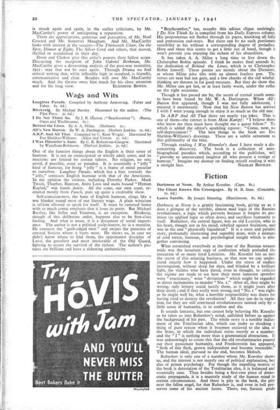Wags and Wits
Ritzkrelg. By Michael Barsley. Illustrated by the author. (The Pilot Press. 35. 6d.)
Behind the Lines. By A. A. Milne. (Methuen. 5s.) ONE of the funniest things about the English is their sense of humour. It is not an emancipated or wholly adult sense, and its reactions are limited by certain taboos. No religion, no sex; avoid, if possible, irony or paradox. It is essentially a " jolly " kind of humour, for being " jolly " is a frame of mind peculiar to ourselves. Laughter Parade, which has a bias towards the " jolly," contrasts English humour with that of the Americans. In my opinion the visitors, including Dorothy Parker, Mark Twain, Thurber, Runyon, Anita Loos and mein freund "Hyman Kaplan," win hands down. All the same, our own team, re- cruited mostly from Punch, puts up quite a creditable show.
Self-consciousness, the bane of English humour, clings like a wet blanket round most of our literary wags. A plain witticism is seldom allowed to speak for itself. It must be rammed home with so much comic emphasis that it loses its point. But Michael Barsley, like Sellar and Yeatman, is an exception. Ritzkrelg, though of this deliberate order, happens also to be first-class fooling. And what is more, it is a document of social import- ance. The author is not a political scalp-hunter, he is a moralist. He censures the "guilt-edged men " and swipes the parasites of crusted Society where it hurts most. He shows us, in case we didn't know where to find them, the opportunist disciples of Laval, the greediest and most intolerable of the Old Guard, fighting to assure the survival of the richest. The author's pic- tures are brilliant and have a sickening authenticity. "Beachcomber," too, assaults this odious clique untiringly. I Do Not Think So is compiled from his Daily Express column. His preposterous wit flashes through its pages, knocking all folly and pretension end-ways. But there can be no such passionate sensibility as his without a corresponding degree of prejudice. Here and there this seems to get a little out of hand, though it won't prevent you enjoying the richest of his absurdities.
It has taken A. A. Milne a long time to live down the Christopher Robin episode. I think he makes final amends by the dedication of Behind the Lines, which is to Christopher Robin himself. These poems are mostly about the Dictators; at whom Milne pere tilts with an almost fearless pen. The verses are neat but not gory, and a few chunks of the old wistful- thinking are thrown in for good measure. But they do show that Mr. Milne can get hot, or at least fairly warm, under the collar on the right occasions.
Though it has passed me by, the secret of eternal youth seems to have been found by Mr. W. A. Darlington. When Alf's Button first appeared, though I was not fully adolescent, I enjoyed it enormously. Now that his New Button has arrived I wish I were young enough to enjoy it as much as the old one.
In A.R.P And All That there are nearly 15o jokes. This is one of them—the extract is from Mein Kampf : " I believe those who knew me then must have thought me a queer fellow." To which is added the editor's sparkling riposte: " Come, now, no self-depreciation! " The best things in the book are Eve Sheldon-Williams's drawings. These are a subtle ornament to this gallimaufry of the blitz.
Through reading I Was Himmler's Aunt I have made a dis-
concerting discovery. The book is a collection of auto- biographical parodies which, according to the publisher, will " provoke to unrestrained laughter all who possess a vestige of humour." Imagine my dismay on finding myself reading it with






























 Previous page
Previous page